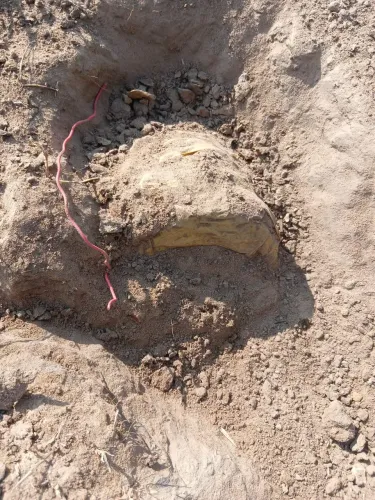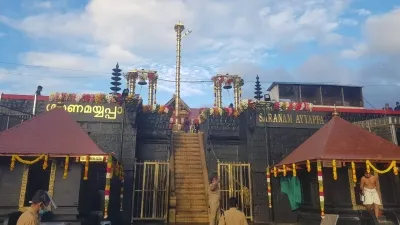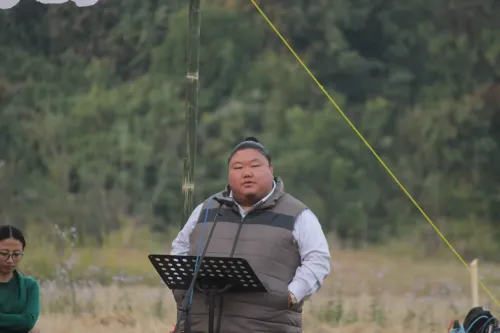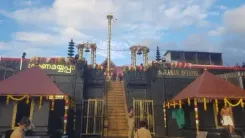Did India Ever Accept External Mediation Since 1971? Ex-Army Chief V.P. Malik Challenges Trump’s Ceasefire Claims
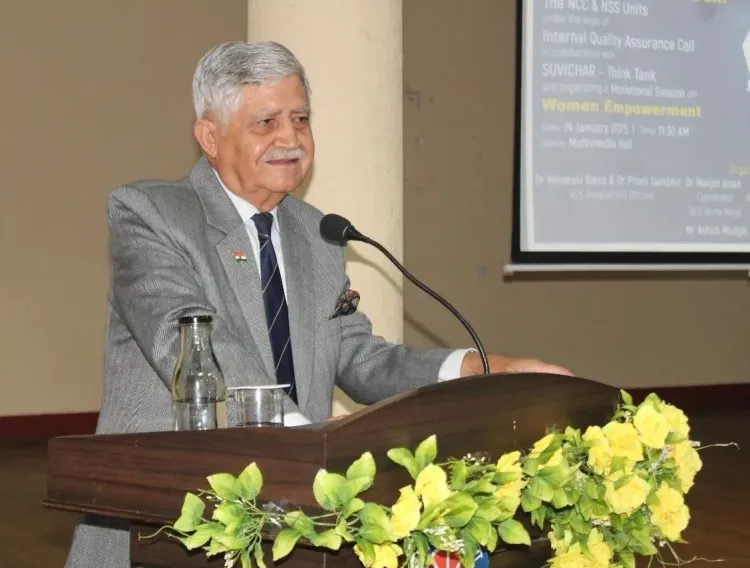
Synopsis
Key Takeaways
- India has never accepted external mediation since 1971.
- The US plays a significant role in monitoring India-Pakistan conflicts.
- Strategic autonomy is crucial for India's national interests.
- Maintaining relations with both Iran and Israel is vital for India.
- India's resilience will help navigate geopolitical challenges.
New Delhi, June 21 (NationPress) In an exclusive interview with IANS, former Army Chief Gen V.P. Malik, who commanded Indian forces to triumph during the 1999 Kargil War, refutes US President Donald Trump's assertions about halting a conflict between India and Pakistan. Drawing upon his extensive strategic background, Gen Malik provides profound insights into US-Pakistan relations, escalating tensions in West Asia, and emphasizes the necessity for India to protect its national interests amid changing global alliances.
IANS: US President Donald Trump has made frequent claims regarding his role in “stopping a war” between India and Pakistan. Based on your expertise and strategic evaluation, how valid are these assertions? Was there ever a point where external mediation significantly influenced the situation?
Gen Malik: The US, as a dominant global power, has interests that span the globe, closely monitoring emerging conflict scenarios. Since both India and Pakistan became nuclear-armed nations in May 1998, the US has been even more vigilant regarding tensions in South Asia. A military conflict between India and Pakistan does not align with American interests; consequently, they exert significant effort to avert it.
During the Kargil conflict, Operation Parakram, and the Mumbai 26/11 attacks, the US engaged in diplomatic dialogue with both nations to avert war. Specifically, during the Kargil conflict, when Pakistan’s Prime Minister visited Washington, President Bill Clinton pressured him to withdraw troops from our side of the Line of Control. Pakistan complied, similarly to the recent events during Operation Sindoor on May 10.
Nonetheless, India pursued its political objectives independently on both occasions, agreeing to a ceasefire with Pakistan only after achieving its aims. While international powers, particularly the US, often attempt to influence conflict situations, India has steadfastly declined any external mediation since 1971. I reject President Trump’s grandiose and inaccurate claim of having stopped the war and mediating the Kashmir dispute between India and Pakistan, a stance echoed by Foreign Secretary Vikram Misri, whose statement I firmly believe.
IANS: What are your thoughts on Trump’s repeated claims of offering to mediate on Kashmir, a sensitive bilateral matter? Does this indicate a broader shift in global powers' approaches to the India-Pakistan conflict?
Gen Malik: I don’t believe that’s the case. Few world leaders take President Trump’s statements seriously. However, it is undeniable that any conflict between India and Pakistan garners the attention of global powers.
IANS: Recently, Trump had a meeting with Pakistan’s Army Chief Asim Munir. What is your perspective on this interaction? Could this strengthen Pakistan's military or alter the South Asian power dynamics?
Gen Malik: I have three observations about this interaction. Firstly, President Trump’s invitation to Asim Munir likely stems from US interests in the ongoing Israel-Iran situation and aims to align Pakistan with its stance on Iran and China, reflecting Trump’s personal interests. This meeting has undoubtedly widened the trust gap between India and the US regarding security matters.
Secondly, the meeting between Trump and Field Marshal Munir highlights the ideological recognition of 'democracy' in both the US and Pakistan, which is paradoxical as Pakistan is essentially a facade of democracy, revealing itself as a military dictatorship. It reiterates the notion that in realpolitik, there are no permanent allies or adversaries, only enduring interests.
Lastly, the implications are not significantly beneficial for Pakistan’s national interest but rather serve the personal agendas of its military leaders. The generals rely on US and Western patronage for post-retirement benefits, which they cannot procure from an alliance with China.
IANS: During your leadership, how did the Indian Army perceive or prepare for potential third-party involvement in India-Pakistan military confrontations, especially post-Kargil? Moreover, there are speculations regarding a coup in Pakistan. What’s your take on this?
Gen Malik: During my tenure, I served under Prime Ministers I.K. Gujral and Atal Bihari Vajpayee. Both aimed to foster healthy bilateral relations with Pakistan, engaging with external powers while making decisions they deemed in the national interest. Given the current political, social, and economic turmoil in Pakistan, along with the Army's leadership under siege due to issues in Balochistan, KPK, and now Operation Sindoor, a military coup in Pakistan is a possibility.
IANS: The escalating tension between Iran and Israel seems alarming. From a military-strategic perspective, how do you interpret the current state?
Gen Malik: This situation is gravely serious and escalating rapidly. Should the US intervene, the situation could worsen. Most nations, including Western and Arab states, would prefer to see Iran abandon its nuclear ambitions. However, a forced regime change in Iran could lead to prolonged chaos in the region. A sustained conflict would adversely impact our diaspora in West Asia, along with our economy, particularly energy needs, necessitating political maneuvering among friendly nations in the region.
IANS: With India maintaining strategic ties with both Israel and Iran, how should New Delhi tactically navigate this intricate crisis on diplomatic and military fronts?
Gen Malik: While we are not solely reliant on either country for critical needs, maintaining robust relations with both Israel and Iran serves our national interests. In addressing emerging challenges, our priority must be our national interests rather than ideological considerations. I foresee no military role except to protect our vital assets, both on land and at sea, as necessary.
IANS: Some analysts suggest that if the Israel-Iran conflict intensifies, it could significantly reshape the power dynamics in West Asia. Could we see Turkey, Russia, and China become more assertive? What implications would this have for India?
Gen Malik: In an extended conflict scenario, should the US intervene, there’s a likelihood that Russia, China, and even some European nations may support Iran diplomatically. They could also potentially provide Iran with intelligence and military supplies while avoiding direct military involvement. For India, I see no military role other than ensuring the protection of our key assets both on land and at sea. Diplomatically, we should aim to diffuse tensions without overtly siding with either party.
IANS: How might a direct confrontation between Israel and Iran influence Indian interests, especially concerning energy security, the safety of our diaspora, and maritime trade through the Strait of Hormuz?
Gen Malik: All these factors would negatively impact our trade, the safety and security of our diaspora in West Asia, employment, revenue, GDP, and developmental progress. Nevertheless, I am confident that India possesses the resilience and capacity to navigate through this challenging situation.
IANS: Is India equipped—diplomatically and militarily—to respond to a potential power realignment in West Asia that could follow a major conflict?
Gen Malik: India has a rich history of social, cultural, and trade interactions with numerous countries in West Asia. We have emerged as a politically and economically influential regional power. Having navigated various crises recently—global and regional security threats, Western sanctions on Iranian and Russian energy supplies, natural disasters, and pandemics—I believe India will successfully adapt to any evolving power dynamics in West Asia.
IANS: Does this changing geopolitical landscape provide India an opportunity to establish itself as a stabilizing force or mediator in the region?
Gen Malik: Every crisis brings both risks and opportunities. Our primary focus should remain on national security and our interests. We should be open to mediating, provided it is acceptable to the conflicting parties, always keeping these principles in view.
IANS: Lastly, having witnessed India through pivotal wartime decisions, what message would you impart to contemporary leaders regarding the importance of strategic autonomy while fostering global partnerships?
Gen Malik: Strategic autonomy means having the ability to make decisions that are in the national interest. I have always contended that (a) there exists a symbiotic relationship between security and economic development, and (b) a sound national defense supports a solid foreign policy. This approach will enable India to strengthen global partnerships without compromising our core values or interests.


